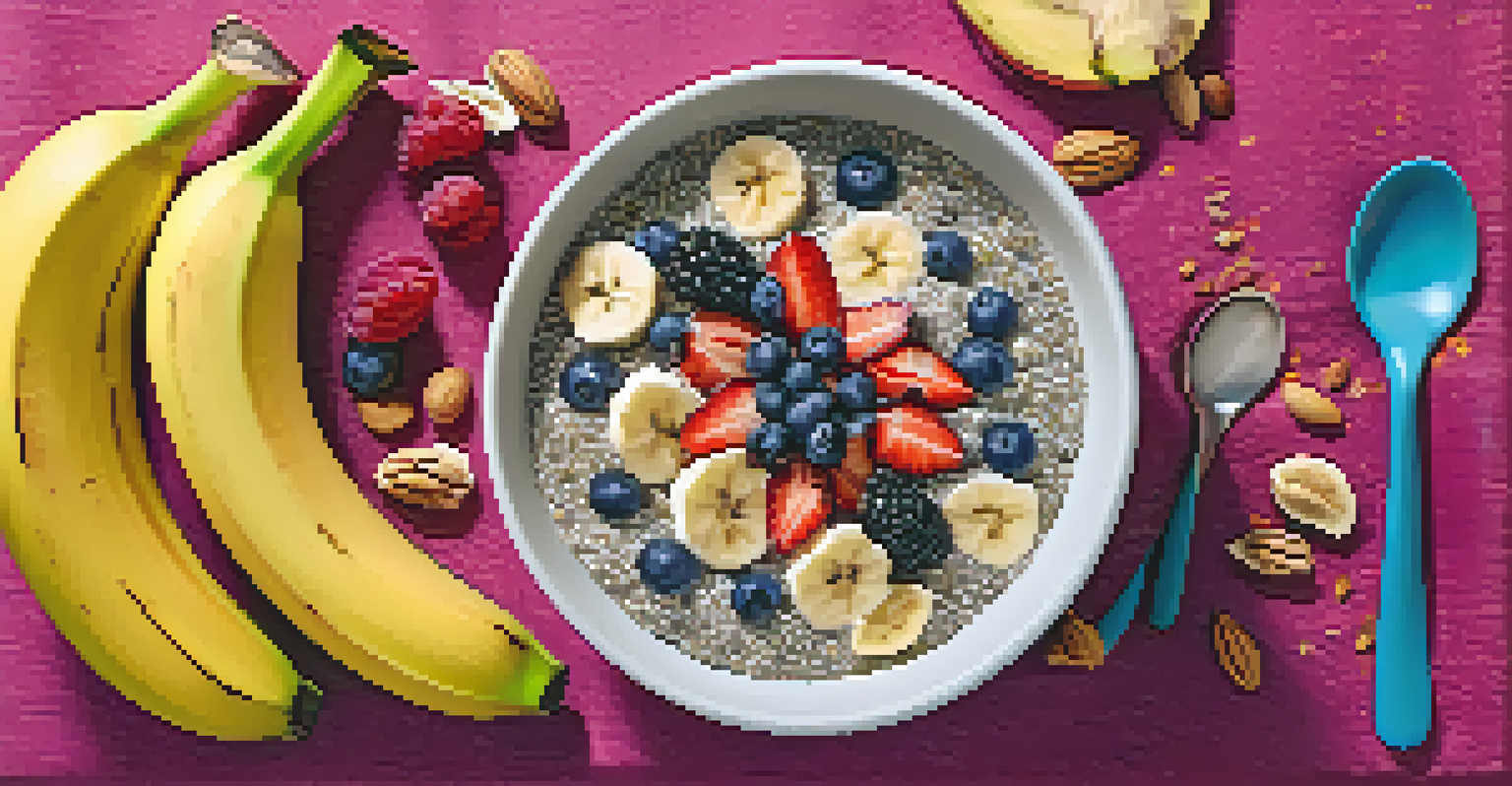Nutritional Foundations of a Raw Food Diet for Athletes

Understanding the Raw Food Diet and Its Benefits
A raw food diet primarily consists of unprocessed, uncooked foods, such as fruits, vegetables, nuts, and seeds. This diet is based on the idea that cooking food can destroy essential nutrients and enzymes that are beneficial for health. For athletes, consuming raw foods can lead to increased energy levels and improved recovery times due to the high nutrient density of these foods.
Let food be thy medicine and medicine be thy food.
One of the key benefits of a raw food diet is its potential to reduce inflammation in the body. Many athletes struggle with post-exercise soreness and inflammation, which can hinder performance. Raw foods, rich in antioxidants and phytochemicals, can help combat these issues, allowing athletes to train harder and recover faster.
Additionally, the high water content in many raw foods helps keep athletes hydrated, which is crucial for optimal performance. Staying well-hydrated can enhance endurance and strength, making a raw food diet a compelling option for those looking to boost their athletic capabilities.
Key Nutrients for Athletes on a Raw Food Diet
Athletes require a variety of nutrients to support their training and recovery, and a raw food diet can provide these essential elements. Key nutrients include carbohydrates for energy, protein for muscle repair, and healthy fats for overall health. Raw fruits and vegetables are excellent sources of carbohydrates, while nuts and seeds can supply the necessary protein and fats.

For example, bananas and sweet potatoes are great sources of easily digestible carbohydrates, providing quick energy for workouts. Meanwhile, almonds and chia seeds offer protein and omega-3 fatty acids, which are important for muscle recovery and inflammation reduction. It's all about finding the right balance to meet an athlete's unique needs.
Raw Food Diet Boosts Athletic Recovery
A raw food diet can enhance recovery for athletes by reducing inflammation and providing high nutrient density.
Moreover, raw food diets are often rich in vitamins and minerals, such as Vitamin C from citrus fruits and potassium from leafy greens. These nutrients play a vital role in maintaining overall health and enhancing athletic performance, making it essential for athletes to incorporate a wide variety of raw foods into their meals.
Challenges of a Raw Food Diet for Athletes
While a raw food diet has its benefits, it comes with challenges that athletes must navigate. One major concern is ensuring adequate caloric intake, as raw foods can be less calorie-dense than cooked options. Athletes with high energy demands may find it challenging to consume enough calories to fuel their workouts.
You are what you eat, so don't be fast, cheap, easy, or fake.
Another issue is the potential difficulty in meeting protein needs. While there are raw protein sources, such as nuts and sprouted grains, athletes may need to be more creative with meal planning to ensure they're getting enough protein for muscle repair and growth. This requires careful consideration and often the addition of supplements to reach daily protein goals.
Lastly, some athletes may find that they experience digestive issues when transitioning to a raw food diet. The high fiber content can lead to bloating or discomfort if introduced too quickly. Gradual changes and listening to one's body are key to navigating these hurdles.
Meal Planning for Raw Food Athletes
Effective meal planning is crucial for athletes following a raw food diet. Creating a balanced meal plan allows athletes to ensure they're getting a variety of nutrients while meeting their energy needs. It's helpful to include a mix of fruits, vegetables, nuts, and seeds in every meal to maximize nutrient intake.
For example, a typical day might start with a smoothie packed with spinach, bananas, and almond milk for breakfast, followed by a lunch of a hearty salad topped with avocados and sunflower seeds. Snacks can include raw energy bars made from dates and nuts, while dinner could consist of zucchini noodles with a fresh tomato sauce. This variety can keep meals exciting and enjoyable.
Meal Planning is Essential
Effective meal planning helps athletes on a raw food diet ensure they meet their energy and nutrient needs.
Moreover, athletes should consider prepping meals in advance to avoid the temptation of less healthy options when in a rush. Batch cooking raw snacks or preparing smoothie packs can save time and ensure that healthy choices are always on hand.
Hydration Strategies for Raw Food Athletes
Staying hydrated is paramount for athletes, and a raw food diet can aid in this aspect due to the high water content in many raw foods. Fruits like watermelon and cucumbers are not only refreshing but also contribute to overall hydration. However, athletes should also be aware of their fluid intake beyond just food.
In addition to consuming hydrating foods, athletes should drink plenty of water throughout the day, especially before, during, and after workouts. Electrolyte-rich raw juices or coconut water can also be beneficial, replenishing essential minerals lost through sweat. These strategies can help maintain optimal hydration levels and support performance.
It's important to listen to your body's thirst cues and drink when needed, as dehydration can negatively impact athletic performance. Keeping a water bottle handy and incorporating hydrating snacks can ensure that athletes stay on top of their hydration game.
Supplementation Considerations for Raw Food Athletes
While a raw food diet can provide many nutrients, some athletes may need to consider supplementation to fill dietary gaps. For instance, Vitamin B12, often found in animal products, is essential for energy production and often lacking in a raw vegan diet. This vitamin is crucial for athletes, as low levels can lead to fatigue and decreased performance.
Omega-3 fatty acids are another nutrient that may require supplementation, especially if an athlete's diet lacks sources like flaxseeds or walnuts. These fats are important for heart health and reducing inflammation, making them vital for recovery after intense workouts.
Hydration is Key for Performance
Staying hydrated is crucial for athletes, and a raw food diet can support this through high water content in fruits and vegetables.
Lastly, protein supplementation might also be necessary for athletes on a raw food diet, particularly if their protein intake from whole foods is insufficient. Protein powders made from pea or hemp are good options to help meet daily protein needs without compromising dietary principles.
Conclusion: Is a Raw Food Diet Right for You?
In conclusion, a raw food diet can offer numerous benefits for athletes, including enhanced energy, reduced inflammation, and improved recovery. However, it's essential to weigh these advantages against the potential challenges, such as caloric intake and protein needs. Ultimately, the decision should be based on individual preferences, training demands, and health goals.
For some athletes, the raw food approach can be invigorating and beneficial, while others may find it limiting or difficult to sustain. It's important to experiment and find what works best for your body and training regimen. Consulting with a nutritionist or dietitian can also provide personalized guidance.

Whether you choose to fully embrace a raw food diet or simply incorporate more raw foods into your meals, the key is to prioritize nutrition that supports your athletic performance and overall well-being. With the right balance, you can thrive as an athlete while enjoying the vibrant flavors of raw foods.